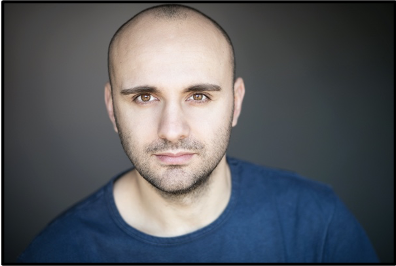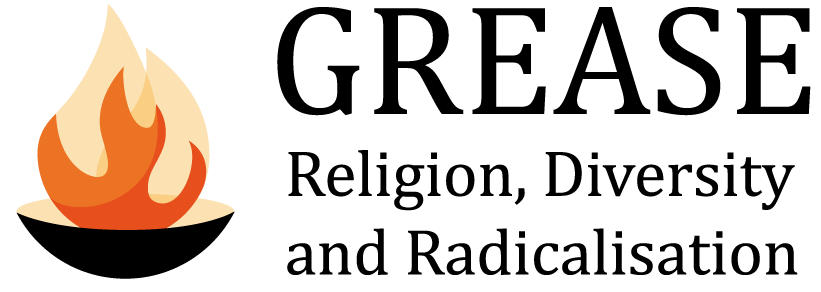May 2020

The first four months of 2020 have been challenging in ways we never expected. Yet, despite the pandemic, GREASE has produced some significant results.
Our most prominent achievement is the release of two globe-spanning documentaries on religious diversity and radicalisation. Luckily, we finished location work on these just before travel bans were imposed. Religion and Society and Countering Religious Extremism are now available to stream online. Below you will find a link to our special GREASE FILMS website where you can watch them at your leisure. You will also find a fascinating interview with the two directors who travelled the world for us making these films.
While showcasing our films, this newsletter also reports on our first project meeting conducted via video conference. Plus, we introduce you to a new booklet highlighting our cooperation with the BRaVE project which focuses on polarization and resilience around Europe.
Like other international research projects, we’re adapting our workflows to accommodate restrictions on international travel. We’re fortunate that most of our field research was completed before the travel bans. We’re now putting the finishing touches on our Indicators Toolkit on Religious Diversity and working on an International Handbook of Good Practices for Building Resilience Against Violent Religious Radicalisation. Meanwhile, we are continuously expanding the collection of articles in our Global Extremes blog and will continue to offer our popular online courses.
The GREASE Documentary Films

The GREASE project consortium proudly presents:
– RELIGION AND SOCIETY
– COUNTERING RELIGIOUS EXTREMISM
These films are accessible free of charge on a dedicated platform through the GREASE website.
Click here to access the GREASE Films
While our documentary films are designed to appeal to all audiences, they are specially tailored for use in educational settings. Created with the help of international filmmaker TERRA, the documentaries feature exclusive interviews shot in seven countries in Europe, the Middle East, Southeast Asia and the Asia Pacific region. All country chapters can be accessed and viewed individually. The GREASE consortium plans to show the films at workshops around the world and will use them to generate discussion.
Religion and Society: How Faith Fits in Around the World
Looking at vastly different cultures, Religion and Society illustrates the multifaceted role religion plays in defining personal identity and mediating one’s relationship with the state. The interviews also reveal some of the tensions that arise in connection with religious diversity.
Countering Religious Extremism: Pathways to Peace
This documentary examines different approaches to building resilience against religiously related or attributed radicalisation. Seen through the eyes of educators, social workers and activists, the film identifies factors that drive radicalisation in different cultural and sociological settings, offering suggestions on how to counter it constructively.
Interview
Making the GREASE films – an eye-opening experience
Diego D’Innocenzo (Director and Producer) and Gabriele Colferai (Director) talk about their experience creating these documentaries for the GREASE project. Both are with the Rome-based film production company Terra.

What were the main challenges you faced in making these films?
Diego D’Innocenzo: The films consist mainly of interviews – people in different countries expressing their deepest thoughts and feelings. Each interviewee told their own story, of course. But we wanted these interviews to tell a bigger story. In the case of Religion and Society we were trying to portray the situation of an entire religious group in a particular country.In Countering Religious Extremism we wanted to describe the effectiveness of a particular type of prevention program. So, our first challenge was to go beyond the regular interview.
Another challenge we faced with Countering Religious Extremism was the sensitive nature of the subject material. Programmes aimed at countering violent radicalisation deal with people in danger of being recruited – or who have already been recruited – to commit acts of violence. In some cases we were dealing with people who had committed violent crimes. They are obviously very difficult to film.

To produce these films, you interviewed people all over the world. Who among them made the strongest impression on you?
Gabriele Colferai: Both films address issues related to religion that people feel very strongly about. While making the film about religions, the person who made the strongest impression on us was Jenny. This is because she represents a segment of the picture that could have been easily left out of the documentary. Because humanism is not strictly a religion, but more a philosophy of life. She is a young member of Humanist UK, an organization of people who don’t believe in anything that is supernatural and promote a very pragmatic form of social activism. What struck us was how the values of a non-believer regarding social coexistence were exactly the same as with the people from all the different religions we had interviewed. That was quite a discovery.
As for Countering Religious Extremism, the programme that made the strongest impression on us was definitely the one involving the Imam visiting prisons. We consider that a perfect example of collaboration between a religious group and the state. It shows how even a simple action not requiring a great amount of money can have tangible results.
The above is a shortened version of our interview with the directors of the GREASE documentaries. The full print interview is available here. You can also watch a video interview with the directors on our film website.
Fruitful Cooperation

While our research consortium has cultivated links with numerous initiatives working in related fields, our closest working relationship is with another EU-funded project called BRaVE. Both projects are coordinated by Anna Triandafyllidou from the European University Institute’s Global Governance Programme.
Though different in scope, our projects share an overlapping interest in the drivers and dynamics of violent radicalisation. Both GREASE and BRaVE explore ways of helping communities build resilience.
The activities of our two projects are highlighted in this joint booklet published by the European University Institute.
Virtual Project Meeting

There’s no substitute for meeting face-to-face in a common location. But when that’s not possible, videoconferencing is the next best thing.
On the 6th and 7th of April, all partners in the GREASE project were scheduled to meet in Brussels. Flights and hotels were booked. A venue had been reserved. Additional meetings had been set up – including a high-level workshop to which invitations had been issued. Then the coronavirus pandemic sent the world into lockdown.
Like everyone else, we’ve had to find alternative ways of keeping our project going without extensive travel. Fortunately, all of our partners have the necessary technology and infrastructure to accommodate sustained video conferencing. So our meeting went ahead pretty much as planned, with partners in 12 countries – located in vastly different time zones – engaging in lively discussions over two consecutive days. Presentations were held. Questions were raised and answered. Decisions were made.
Meeting face-to-face provides opportunities for informal exchanges that are crucial for optimal group communications. But conditions during the pandemic are anything but optimal. At the moment we are concentrating on achieving what is possible, making use of the resources we have to keep on working productively and safely.
Interested in what we’re doing? Subscribe to our newsletter HERE
